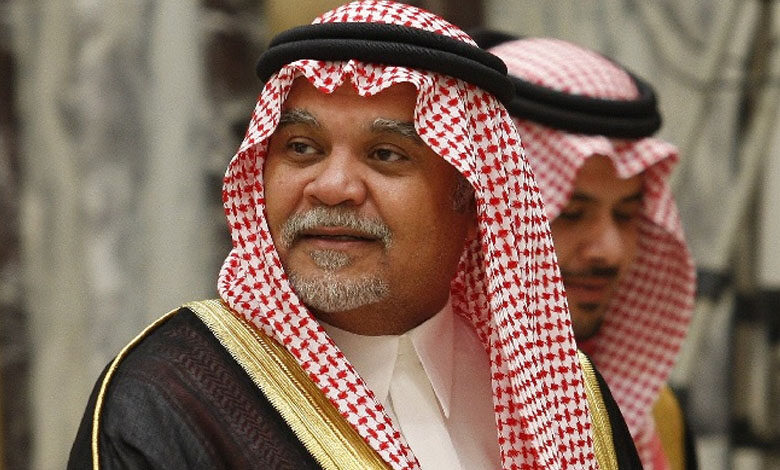Saudi Arabia’s Prince Bandar bin Sultan appealed Palestinian leaders about peace agreement

Saudi Arabia’s former ambassador to the US Prince Bandar bin Sultan has appealed out the Palestinian leadership for its refusal of the UAE-Israel peace agreement.
Prince Bandar said in an exclusive interview with Al Arabiya: This low level of discourse is not what we expect from officials who seek to gain global support for their cause. Their transgression against the Gulf States’ leadership with this reprehensible discourse is entirely unacceptable.
Prince Bandar, who served as Saudi Arabia’s ambassador to the US from 1983 to 2005 and the Kingdom’s intelligence chief from 2014 to 2016, reported that the criticism of the UAE and other Gulf countries after the agreement with Israel had been painful to hear.
Indeed, Palestinian leaders including President Mahmoud Abbas have called the decision of the UAE to normalize ties with Israel as a stab in the back of the Palestinian people. But he later backtracked and banned offensive statements about other Arab leaders, after a request from GCC Secretary-General Nayef al-Hajraf to apologize.
The reaction of Hamas in Gaza and the Palestinian Authority (PA) in the West Bank reflected their broader failures, according to Prince Bandar. He also said: Gaza Strip leaders, who have seceded from the PA to govern Gaza independently, accuse the West Bank leadership of treason, while at the same time, West Bank leadership has accused separatist Gaza Strip leaders of stabbing them in the back,.
Prince Bandar added: Efforts in the past years would have been better spent on the Palestinian cause, peace initiatives, and protecting the rights of the Palestinian people to reach a point where this just, albeit robbed, cause can finally see the light, and when I say robbed, I mean both by Israel and Palestinian leaders equally.
It should be noted that Bahrain followed the UAE and accepted to normalize ties with Israel on September 15, and the two countries have declared that they remain committed to a just solution for Palestinians. Saudi Arabia’s Foreign Minister Faisal bin Farhan reported that the Kingdom’s stance on the Palestinian cause is firm and will not change in response to the peace deals.
Palestinian leaders have history of failure
Prince Bandar related that while the Palestinian cause is just, its leaders have a history of failure. He informed Al Arabiya that the Palestinian cause is a just cause, but its advocates are failures. The Israeli cause is unjust, but its advocates are successful. That sums up the events of the last 70 or 75 years.
Prince Bandar indicated the example of Amin al-Husseini, the Palestinian religious lead who was one of the principal leaders of the Palestinian issue while the country was under the British mandate from 1918 to 1948.
In fact, Al-Husseini was known for their sympathies to Nazi Germany as an alternative supporter to undermine British rule over Palestine. The Palestinian revolution against British rule known as the Arab Revolt from 1936 to 1939 was a tragedy for the Palestinian people, while one in ten men exiled, imprisoned, or dead; the pro-German approach of al-Husseini downed with the defeat of Nazism in World War II.
Prince Bandar has also criticized Palestinian Liberation Organization (PLO) leader Yasser Arafat, who he named Abu Ammar, for supporting Iraq’s Saddam Hussein in the first Gulf War in 1990. It should be noted that Arafat visited Dictator Hussein in 1990 during the short-lived Iraqi occupation of Kuwait. He also explained that Kuwait was then an occupied Arab nation, and it had, alongside the other Gulf States, always welcomed the Palestinians with open arms and was home to Palestinian leaders.
Prince Bandar continued to explain: Yet we saw Abu Ammar in Baghdad, embracing, laughing and joking with Saddam, congratulating him for what had happened. This has had a painful impact on all the peoples of the Gulf, especially on our Kuwaiti brothers and sisters, specifically the Kuwaitis who stayed in Kuwait and resisted the occupation.
Furthermore, Prince Bandar related that Saudi Arabia had not responded against the Palestinian leadership, even the apparition of images that showing young Palestinians in Nablus celebrating and holding images of Hussein when Iraqi rockets targeted Riyadh during the Gulf War.
He recently criticized the failure of different Palestinian groups to make a deal in peace discussions organized in Egypt, saying: How can we speak in the name of all Palestine, and convince others to support our cause, when we ourselves are not united, and when the Palestinians are divided amongst themselves?
Saudi Arabian support for Palestine
In this context, Prince Bandar said that Saudi Arabia has historically backed Palestine although its leadership’s mistakes. The prince explained the history of Saudi Arabian support for the Palestinians, including the 1945 gathering between King Abdulaziz ibn Saud and US President Franklin Roosevelt, in which the king pushed for the Palestinian issue He also indicated an initiative under Saudi Arabia’s King Abdullah that pointed to unify the Palestinian leadership.
Hamas and the PA accepted an agreement in Mecca after intensive Saudi Arabian brokering, according to the prince, adding: Only a few days after they left Saudi Arabia, we received news that each side had already dishonored their agreement and gone back to conspiring against each other once again. This reflected the failure of the Palestinian organizations, who had taken Saudi Arabian support for granted, added Prince Bandar.
Prince Bandar said: I believe that we in Saudi Arabia, acting on our good will, have always been there for them. Whenever they asked for advice and help, we would provide without expecting anything in return, but they would take the help that we provide and ignore the advice. Then they would fail and turn back to us again, and we would support them again, regardless of their mistakes, about which were honest to them. He added: I think the circumstances and times have changed, and I think it is only fair to the Palestinian people to know some truths that have been kept hidden. According to him, Palestinians were wrong to look to either Iran or Turkey as their ally. He asked: Who are the allies of the Palestinians now? Is it Iran, which is using the Palestinian cause as a bargaining card at the expense of the Palestinian people? Iran and Khomeini, who want to liberate Jerusalem through Yemen, Lebanon, and Syria?
He also added: Or is it Turkey, which Hamas leaders have thanked for its stance in support of Hamas and the Palestinian cause? That is simply because Erdogan announced that he was withdrawing his ambassador from the UAE in support of the Palestinian cause. He also discussed other elements of the history of the Palestinian cause, including Saudi Arabia’s policy under King Abdulaziz and the 1967 Arab-Israeli War.












